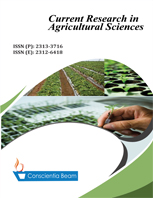Molecular Characterization of Parental Lines of Rice Aiming to Address High Yield and Nutritional Quality Under Drought and Cold Stress Condition
DOI:
https://doi.org/10.18488/journal.68.2017.42.51.60Abstract
Abiotic stresses limit crop growth at different growth stages resulting low yield of rice. Molecular characterization of parental materials gives precise information on the extent of genetic diversity exists between them. A set of 60 SSRs randomly distributed over 12 chromosomes were used to analyze eight cultivars intend to be used as parent in breeding programs to address cold and drought tolerance, and nutritional quality of rice. A total of 300 alleles were detected across the cultivars for 51 polymophic markers with 5.88 alleles per loci. On average 30.6% of the genotypes shared a common allele at any given locus. UPGMA cluster analysis showed that 67% common alleles were shared by the cultivars. The cultivars were clearly grouped into two distinct clusters at 67.0% genetic similarity. Hbj. BVI showing high tolerance to cold stress at seedling stage differed from cold susceptible BR1, BRRI dhan28 and BRRI dhan29 by 33% alleles while BR18 that showed moderately cold tolerance differed by 29.0 - 29.9% alleles which indicated that only 3-4% alleles difference caused higher cold tolerance in Hbj. BVI. The moderate genetic distance between cold tolerant Hbj. BVI and high yielding BRRI dhan28 and BRRI dhan29 indicated that there is higher possibility of obtaining high yielding cold tolerant segregants from the crosses between them. On the other hand, Kalobokri, which had 31.7 mg zinc a kilogram of polished rice differed by 33.0% alleles from the drought tolerant rainfed low varieties BRRI dhan56 and BRRI dhan57 having moderate level of zinc (~20 mg/kg), which also indicated that crosses between them might produce progenies with higher nutritional quality under drought environment.

